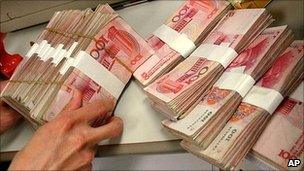China raises bank reserve ratio to curb rising prices
- Published

China's move is aimed at curbing the country's inflation
China has raised the limit on the amount of cash that the country's banks have to keep in reserves in an attempt to rein in rising prices.
The central bank raised the reserve ratio requirement (RRR) for banks by 50 basis points to 21.5%, a record high.
The move means that banks will have fewer funds available to lend, which may result in a slowdown in demand.
Latest data showed that inflation hit a 34-month high in May as consumer prices rose by 5.5% on an annual basis.
Analysts said that the central bank's prompt response is an indication that fighting rising prices is a top priority for the government.
"The government is doing something," said Barry Lam of CCB International.
"That is the key message the government is sending to the stock market investors and a warning to the banking system to be careful about their lending." he added.
Keith Bowman of Hargreaves Lansdown said that the central bank's decision was also an indication that authorities were wary of an overheating of the Chinese economy.
"A measured slowdown in the Chinese economy is just what investors want, with today's figures providing some hope that this is just what is unfolding," he said.
- Published14 June 2011
- Published13 June 2011
- Published18 April 2011